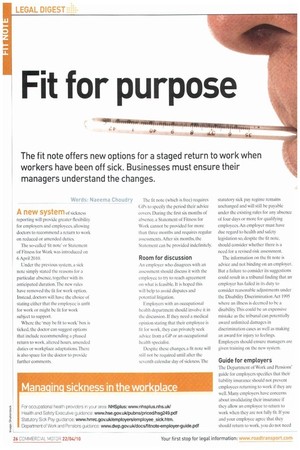11 Fit for purpose
Page 26

Page 27

If you've noticed an error in this article please click here to report it so we can fix it.
The fit note offers new options for a staged return to work when workers have been off sick. Businesses must ensure their managers understand the changes.
Words: Naeema Choudry The fit note (which is free) requires A new system of sickness reporting will provide greater flexibility for employers and employees, allowing doctors to recommend a return to work on reduced or amended duties.
"Ibe so-called 'fit note' or Statement of Fitness for Work was introduced on 6 April 2010.
Under the previous system, a sick note simply stated the reasons for a particular absence, together with its anticipated duration.The new rules have removed the fit for work option. Instead, doctors will have the choice of stating either that the employee is unfit for work or might be fit for work subject to support.
Where the 'may be fit to work' box is ticked, the doctor can suggest options that include recommending a phased return to work, altered hours, amended duties or workplace adaptations.There is also space for the doctor to provide further comments. CiPs to specify the period their advice covers. During the first six months of absence, a Statement of Fitness for Work cannot be provided for more than three months and requires regular assessments. After six months, the Statement can be provided indefinitely
Room for discussion
An employer who disagrees with an assessment should discuss it with the employee to try to reach agreement on what is feasible. It is hoped this will help to avoid disputes and potential litigation.
Employers with an occupational health department should involve it in the discussion. If they need a medical opinion stating that their employee is lit for work, they can privately seek advice from a GP or an occupational health specialist.
Despite these changes, a fit note will still not be required until after the seventh calendar day of sickness. The statutory sick pay regime remains unchanged and will still be payable under the existing rules for any absence of four days or more for qualifying employees. An employer must have due regard to health and safety legislation so, despite the fit note. should consider whether there is a need for a revised risk assessment.
The information on the fit note is advice and not binding on an employer. But a failure to consider its suggestions could result in a tribunal finding that an employer has failed in its duty to consider reasonable adjustments under the Disability Discrimination Act 1995 where an illness is deemed to be a disability.This could be an expensive mistake as the tribunal can potentially award unlimited damages in discrimination cases as well as making an award for injury to feelings Employers should ensure managers are given training on the new system.
Guide for employers
'The Department of Work and Pensions' guide for employers specifies that their liability insurance should not prevent employees returning to work if they are well. Many employers have concerns about invalidating their insurance if they allow an employee to return to work when they are not fully fit. If you and your employee agree that they should return to work, you do not need
to wait until the end of the Statement period for them to do so. However. an employer might still need to undertake a risk assessment. Guidance can be found on the Department of Work and Pensions website.
Disagreement
Tliere could be situations where a doctor's advice and the employer's knowledge of the workplace make the employer believe the employee can return to work safely, but the employee disagrees. If this is the case, the employer needs to discuss the issues with the employee as there could he something about their condition or work that the employer has not considered.
However, if no agreement on fitness for work can be reached, the employer should consult an occupational health specialist.
If your firm does not have a formal absence management policy, now would be a good time to initiate one.
Many employers remain sceptical about whether the fit note will help to reduce long-term absence. Only time will tell. A government evaluation of the new system is due to be published in 2012/2013. • • Naeema Chnudr■ is a partner at international law firm F‘erlietl‘, I.LP
































































































































